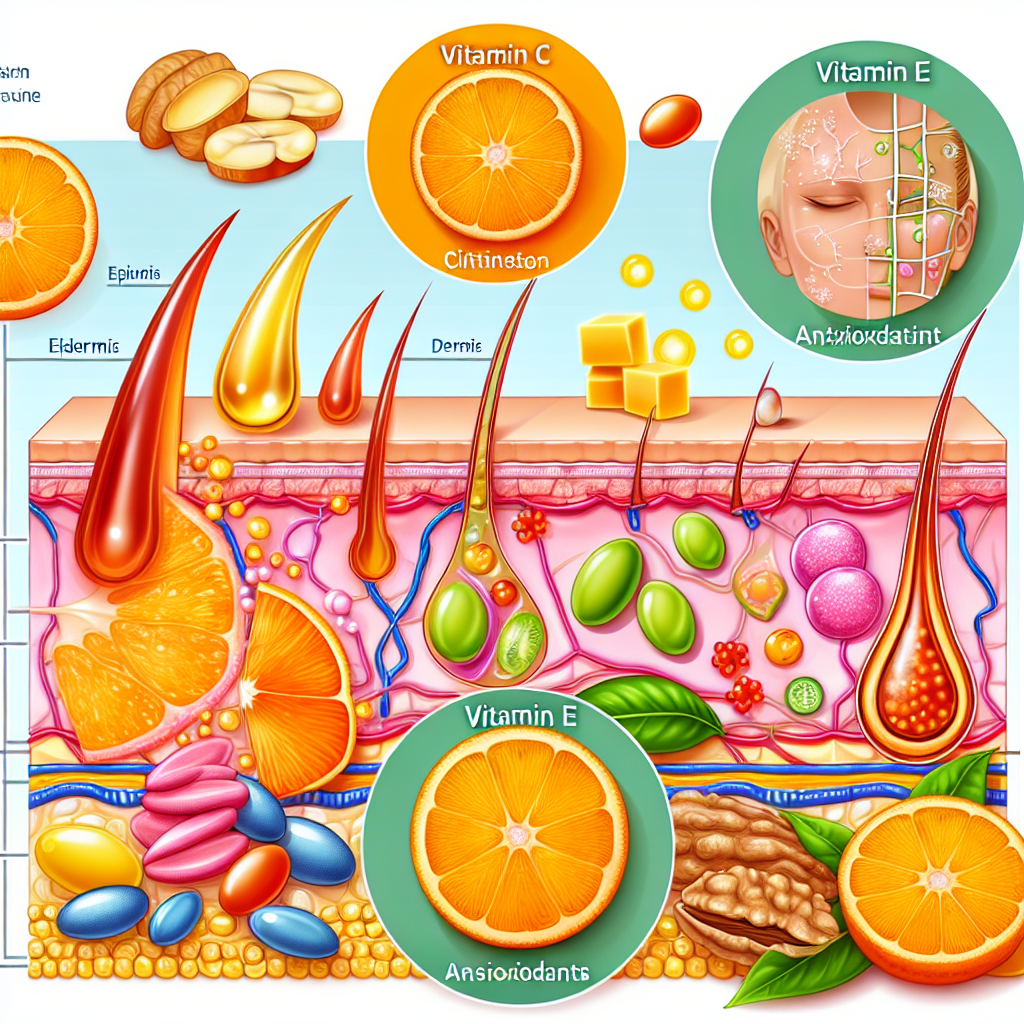How Vitamin C and E Keep Your Skin Glowing

Discover the secret to glowing skin with Vitamins C and E! Learn how these essential nutrients can enhance your skin’s health and radiance. Don’t wait, start your journey to vibrant skin today. Click here to find out more.
The Role of Vitamin C and E in Achieving Radiant Skin
The quest for radiant, glowing skin is a journey that many embark on, but few truly understand the science behind achieving this coveted glow. The secret to radiant skin lies not only in the products we apply topically but also in the nutrients we consume. Among these, vitamins C and E play a pivotal role in maintaining skin health and enhancing its natural glow.
Vitamin C, also known as ascorbic acid, is a potent antioxidant that is essential for the health of your skin. It plays a crucial role in collagen synthesis, a process that helps maintain the skin’s elasticity and firmness. Collagen is a protein that gives the skin its structure, and as we age, its production naturally decreases, leading to wrinkles and sagging skin. By boosting collagen production, vitamin C helps to keep the skin looking youthful and firm.
Moreover, vitamin C is known for its ability to brighten the skin and reduce the appearance of hyperpigmentation and dark spots. It does this by inhibiting the enzyme tyrosinase, which is responsible for melanin production. Melanin is the pigment that gives our skin, hair, and eyes their color, and an overproduction can lead to dark spots and uneven skin tone. By regulating melanin production, vitamin C can help to even out skin tone and enhance its natural glow.
On the other hand, vitamin E is another powerful antioxidant that works in tandem with vitamin C to protect the skin from damage. It is fat-soluble, meaning it can penetrate deep into the skin’s layers to provide nourishment. Vitamin E is particularly effective in protecting the skin from environmental damage caused by exposure to harmful UV rays and pollution. It does this by neutralizing harmful free radicals that can damage skin cells and accelerate the aging process.
In addition to its protective properties, vitamin E also has moisturizing benefits. It helps to strengthen the skin’s natural barrier, preventing moisture loss and keeping the skin hydrated. Hydrated skin is plumper, smoother, and has a natural glow, making vitamin E essential for achieving radiant skin.
Furthermore, when vitamin C and E are combined, they create a synergistic effect that enhances their individual benefits. Vitamin C helps to regenerate vitamin E, enhancing its antioxidant power, while vitamin E helps to stabilize vitamin C and increase its longevity. This powerful duo works together to protect, repair, and nourish the skin, promoting a healthy, radiant glow.
In conclusion, vitamins C and E are essential for maintaining skin health and achieving a natural glow. They work together to boost collagen production, regulate melanin production, protect the skin from environmental damage, and keep it hydrated. Incorporating these vitamins into your skincare routine and diet can help you achieve the radiant, glowing skin you’ve always desired. However, it’s important to remember that while these vitamins are beneficial, they are not a substitute for a balanced diet, adequate hydration, and protection from the sun. Achieving radiant skin is a holistic process that requires a combination of good skincare practices and a healthy lifestyle.
Unlocking the Secret to Glowing Skin: The Power of Vitamins C and E

Unlocking the secret to glowing skin is a quest that many embark on, but few truly master. The beauty industry is saturated with products promising to deliver radiant, youthful skin, but the truth is, the key to achieving this lies in the power of vitamins, specifically Vitamin C and E. These two vitamins are essential for maintaining healthy, glowing skin, and understanding their benefits can help you incorporate them into your skincare routine effectively.
Vitamin C, also known as ascorbic acid, is a potent antioxidant that plays a crucial role in maintaining skin health. It is renowned for its ability to neutralize harmful free radicals that are produced when the skin is exposed to ultraviolet (UV) light and pollution. These free radicals can cause damage to the skin cells, leading to premature aging and a dull complexion. By neutralizing these harmful particles, Vitamin C helps to protect the skin, promoting a youthful, radiant appearance.
Moreover, Vitamin C is essential for the production of collagen, a protein that gives the skin its firmness and elasticity. As we age, our bodies produce less collagen, leading to the formation of wrinkles and fine lines. By boosting collagen production, Vitamin C helps to maintain the skin’s elasticity, reducing the appearance of these aging signs and promoting a smooth, firm complexion.
On the other hand, Vitamin E is another powerful antioxidant that works in synergy with Vitamin C to protect the skin from damage. It is fat-soluble, meaning it can penetrate deep into the skin layers, providing protection where it’s most needed. Vitamin E has the unique ability to absorb UV light, reducing its damaging effects on the skin. This makes it an essential ingredient in sunscreens and other skincare products designed to protect the skin from sun damage.
In addition to its protective properties, Vitamin E also has significant moisturizing benefits. It helps to strengthen the skin’s natural barrier, locking in moisture and preventing dryness. This results in a hydrated, plump complexion that radiates health and vitality. Furthermore, Vitamin E has been shown to reduce inflammation in the skin, which can help to calm conditions such as acne and eczema, promoting a clear, even skin tone.
Incorporating these two vitamins into your skincare routine can significantly improve the health and appearance of your skin. They can be found in a variety of skincare products, from serums and moisturizers to sunscreens and face masks. When choosing products, look for those that contain both vitamins, as they work best when used together.
However, it’s important to remember that skincare is just one piece of the puzzle. A balanced diet rich in fruits and vegetables, regular exercise, and adequate sleep are also essential for maintaining healthy, glowing skin. By combining a holistic approach to health and wellness with a targeted skincare routine, you can unlock the secret to radiant, youthful skin.
In conclusion, the power of Vitamins C and E in maintaining and enhancing skin health cannot be overstated. These potent antioxidants protect the skin from damage, boost collagen production, and provide essential hydration, promoting a radiant, youthful complexion. By understanding their benefits and incorporating them into your skincare routine, you can harness their power and achieve the glowing skin you’ve always desired.
How Vitamins C and E Contribute to Skin Health and Glow
Vitamin C and E are two essential nutrients that play a significant role in maintaining the health and glow of your skin. These vitamins are potent antioxidants that protect the skin from harmful free radicals, promote collagen production, and help in skin repair and regeneration.
Vitamin C, also known as ascorbic acid, is a water-soluble vitamin that is crucial for the synthesis of collagen, a protein that provides structure and elasticity to the skin. Collagen production naturally decreases with age, leading to the formation of wrinkles and fine lines. By boosting collagen production, vitamin C helps to maintain the skin’s firmness and elasticity, thereby reducing the signs of aging.
Moreover, vitamin C is a powerful antioxidant that neutralizes harmful free radicals produced by exposure to ultraviolet (UV) radiation and environmental pollutants. Free radicals can damage the skin cells, leading to premature aging and skin diseases. By neutralizing these harmful molecules, vitamin C protects the skin from damage, helping to maintain its health and glow.
In addition to its antioxidant properties, vitamin C also has a brightening effect on the skin. It inhibits the enzyme tyrosinase, which is responsible for the production of melanin, the pigment that gives skin its color. By inhibiting melanin production, vitamin C can help to lighten dark spots and hyperpigmentation, resulting in a more even skin tone.
On the other hand, vitamin E, also known as tocopherol, is a fat-soluble vitamin that is also a potent antioxidant. Like vitamin C, vitamin E protects the skin from damage caused by free radicals. However, as a fat-soluble vitamin, vitamin E is particularly effective at protecting the skin’s lipid barrier, which helps to keep the skin hydrated and plump.
Vitamin E also has anti-inflammatory properties, which can help to soothe and calm irritated skin. This makes it particularly beneficial for individuals with sensitive or inflamed skin conditions, such as eczema or psoriasis. Furthermore, vitamin E has been shown to enhance the effectiveness of sunscreen, providing additional protection against harmful UV radiation.
When used together, vitamins C and E can provide synergistic benefits for the skin. Studies have shown that the combination of these two vitamins provides more comprehensive protection against UV damage than either vitamin alone. This is because vitamin C and E work together to neutralize free radicals, with vitamin C regenerating oxidized vitamin E to enhance its antioxidant capacity.
In conclusion, vitamins C and E are essential for maintaining the health and glow of your skin. They protect the skin from damage, promote collagen production, and help in skin repair and regeneration. By incorporating these vitamins into your skincare routine, either through topical application or dietary intake, you can help to keep your skin looking youthful and radiant. However, it’s important to remember that while these vitamins can provide significant benefits for your skin, they are not a substitute for a healthy lifestyle and proper sun protection. Always consult with a dermatologist or skincare professional to determine the best skincare regimen for your specific needs.